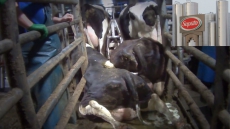CALGARY — Native and environmental groups are fighting a pair of proposed Enbridge pipelines that would cross lake-dotted country in northern Minnesota.
The Sandpiper and Line 3 Replacement projects would take the same route through much of the state — carrying North Dakota light oil and oilsands crude, respectively, to Superior, Wisc.
Opponents are using a variety of legal and bureaucratic means to stymie the pipelines, which are at different stages in the Minnesota regulatory process. Both are slated to start up in 2017.
For Ojibwe communities near the headwaters of the Mississippi River, the big concern is over wild rice beds, said Winona LaDuke, executive director of Honor the Earth, an environmental group based on the White Earth reservation.
Not only is wild rice a sacred crop to her people, but it's a major source of income, said LaDuke.
"It is the only thing our people can count on. You cannot count on the U.S. economy," she said.
"But you can count on your rice."
The $2.6-billion Sandpiper pipeline is already about a year behind schedule because the Minnesota Public Utilities Commission last fall decided to review the need for the project and its route separately, rather than at the same time.
The commission granted Enbridge a certificate of need for Sandpiper in early June, a move that LaDuke said was tantamount to a "declaration of war." Groups are planning to challenge the certificate as soon as they're able. The route permitting process is now underway.
Meanwhile, the commission is just about to begin reviewing the Line 3 Replacement. The $7.5-billion project, the biggest in Enbridge's history, involves decommissioning a nearly half-century old pipeline that runs between Hardisty, Alta., and Superior and replacing it with all new pipe.
Enbridge spokeswoman Lorraine Little said the lines don't cross reservation boundaries, so there's no formal negotiation process with bands. The Ojibwe do, however, gather, hunt and fish on ceded land.
Some, but not all, native groups have chosen to engage in consultations with the Calgary-based company, said Little.
"We certainly are sensitive to the concerns that have been raised in terms of the wild rice. And so that is part of the consultation process and the conversations that we'd like to have with the reservations to address those concerns."
Frank Bibeau, a lawyer for Honor the Earth, is drawing on his past career experience in the Minnesota government to "add confusion and delay" to the process.
"I think there's going to be a lot bigger fight than Enbridge understands right now," he said.
While opponents would prefer pipelines not be built in the first place, many are pragmatic.
Friends of the Headwaters, a local environmental group, pitched a route that juts diagonally across southwestern Minnesota, well away from most wild rice lakes.
"We understand that in the practical realities of today's world, that there's still a need to move petroleum product around the nation and around North America," said Richard Smith, with Friends of the Headwaters. "We think that Enbridge already has too large a footprint across Minnesota's northern water resources."
Enbridge pipelines have been crossing through the area for several decades. Smith is concerned that if Line 3 and Sandpiper go ahead, yet more pipelines will proliferate.
Little foresees Enbridge having to make "micro-adjustments" to Sandpiper to minimize impacts, but a drastic reroute would only mean a longer pipe that would affect more densely populated areas.
Joe Plumer, a lawyer who represents the White Earth reservation, said he recognizes that "they're probably going to put a pipeline through," but the company's proposed Sandpiper path "is the worst route that they ever could have chosen."
"The waters communicate above and below ground in those sensitive areas. You can't segregate a spill."





